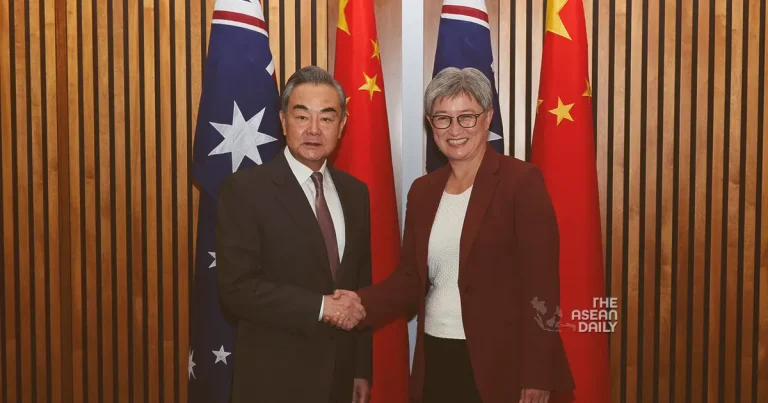21-3-2024 (CANBERRA) Chinese Foreign Minister Wang Yi has called upon Australian businesses and academics to increase their engagement with China, particularly in the field of green energy, as he reaffirmed the resumption of bilateral relations between the two countries following a successful reset.
During his first visit to Australia as Chinese foreign minister since 2017, Wang participated in the seventh Australia-China Foreign and Strategic Dialogue in Canberra on Wednesday. Following the official meeting with Australian Foreign Minister Penny Wong, Wang engaged in private discussions with a group of Australian leaders, including Australia China Business Council (ACBC) president David Olsson, Rio Tinto iron ore chief executive Simon Trott, and defence expert and Australia National University professor Hugh White.
According to a statement from the ACBC, Wang expressed China’s commitment to transitioning its economy towards a “green, high-quality growth model”. Olsson noted the potential benefits for Australian exporters and the country’s decarbonisation efforts from increased cooperation with China in green energy initiatives.
The discussions between Wang and the Australian leaders also encompassed topics such as investments, education, digital trade, and China’s relations with the United States and Asia. Olsson described the meeting as a “free-ranging discussion” reflecting diverse perspectives from the Australian side and highlighted the positive tone of the dialogue.
Wang emphasised the commonalities between Australia and China, advocating for partnership rather than confrontation. The bilateral relationship between the two nations hit a low point at the onset of the pandemic due to various tensions, including issues related to Sinophobia, suspicions of Chinese foreign interference, and trade disputes.
Wang proposed that both countries collaborate to address global challenges such as climate change, stressing that stable bilateral relations contribute to global certainty. He urged both nations to maintain momentum in their relationship and continue progressing together.
During his meeting with Wong, Wang expressed his willingness to enhance high-level exchanges between China and Australia and support cooperation across all sectors. Vicki Thomson, chief executive of the Group of Eight Australia university coalition, highlighted the importance of research collaboration between nations in fostering enduring ties and practical cooperation.
However, concerns have been raised about the recent raids on Chinese academics in Australia by security agencies, which may affect visits to Australia. Regarding China’s trade restrictions on Australian exports, Wong welcomed China’s decision to lift export-prohibitive tariffs on Australian wine and expressed hope for similar measures on beef and lobsters.
Wong also addressed other sensitive issues, including the case of detained Australian academic Yang Hengjun, human rights abuses in Xinjiang, Tibet, and Hong Kong, and activities in the South China Sea. On a lighter note, Wong mentioned the likelihood of extending the stay of two pandas on loan from China at Adelaide Zoo.
Despite the positive developments in bilateral relations, allegations from right-wing publication The Australian regarding former Australian Prime Minister Paul Keating’s meeting with Wang briefly stirred controversy. Keating dismissed the allegations, emphasizing the importance of constructive dialogue between Australia and China.




